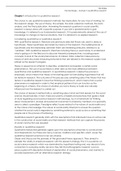YSS-20306
Hennie Boeije – Analysis in qualitatitive research
Chapter 1: Introduction to qualitative research
The choice to use qualitative research methods has implications for your way of working, for
the research design, the use of theory, the sample, the data collection methods, the data
analysis, and the final publication. Answering the research questions in social scientific
research is always done with a specific purpose. If your aim is predominantly to gain
knowledge, it is referred to as fundamental research. If it is predominantly aimed at the use of
knowledge to change or improve situations, then it is referred to as applied research.
Considering quantitative or qualitative research
With quantitative research, literature and previously selected theory are used to deduce
hypotheses. These hypotheses are tested by means of the research. The building blocks of
hypotheses and the relationship between them are interesting attributes, referred to as
‘variables’. With qualitative research, literature including theory is used mainly to understand
what is going on in the field and to discover theoretical perspectives, including proper
concepts to look at the social phenomenon of interest. Data collection takes place by
means of semi-structured measuring instruments that are tailored to the research subject and
refined as the research progress.
Theory is viewed as an attempt to describe, understand and explain a certain social
phenomenon. The use of social theory is often seen as the main difference between
quantitative and qualitative research. In quantitative research a deductive process is
employed, which means that theory is the starting point for formulating hypotheses that will
be tested in research. The outcome of this process says something about the theory that was
tested. In qualitative research inductive thinking is paramount, which means that a social
phenomenon is explored in order to find empirical patterns that can function as the
beginning of a theory. The choice of whether you test a theory or build one naturally
influences how the research is carried out.
The choice of research method tells us something about what we think research in the social
science should look like. In fact, there are systems of beliefs and practices that guide a field
of study regarding social science research methodology. Such a framework for thinking
about measurement, analysis and personal involvement is shared by members of a speciality
area is called a paradigm. Paradigms reflect issues related to the nature of social reality and
to the nature of knowledge. The nature of social reality attempts to answer the question
whether the social world is regarded as something external to social actors or something that
people are in the process of fashioning.
Qualitative research generally starts with the assumptions that individuals have an active role
in the construction of social reality and that research methods that can capture this process
of social construction are required.
Diversity in qualitative research
Qualitative researchers generally agree upon the assumptions attached to constructivism
and interpretivism, but there are many nuances, traditions and specifics which cause the
qualitative research practice to be very diverse.
Glaser and Strauss are the pioneers of the grounded theory approach. They aimed to
rekindle the vitality in empirical research with this research strategy. First, it is a polemic on
social science research which was dominated by hypothesis testing and, was devoid of any
connection to everyday reality. Second, they felt that ethnographic research was too
preoccupied with description instead of explanation of social phenomena, and wanted to
provide researchers with an alternative research strategy.
, YSS-20306
Hennie Boeije – Analysis in qualitatitive research
Glaser and Strauss offered a methodology in which the data became centre-stage in
reaching a theoretical description of a phenomenon and explaining it. Its emphasis on theory
development sets grounded theory apart from other branches of qualitative research.
Originally, grounded theory was framed in terms of a series of cycles in which the researcher
moves back and forth among the data collection and the analysis.
Defining and delineating qualitative research in this book
The following definition of qualitative research is used in this book:
“The purpose of qualitative research is to describe and understand social phenomena in
terms of the meaning people bring to them. The research questions are studies through
flexible methods enabling contact with the people involved to an extent that is necessary
to gasp what is going on in the field. The methods produce rich, descriptive data that
need to be interpreted through the identification and coding of themes and categories
leading to findings that can contribute to theoretical knowledge and practical use.”
Looking for meaning
The starting point for a qualitative inquiry is to discover the meaning that people award to
their social worlds and to understand the meaning of their social behaviour. But meaning-
giving processes do not yield everything required for analysis. There are also socially
‘hardened’ ways of thinking, feeling and acting.
Using flexible methods that enable contact with participants
Field work requires a constant redefinition of what is problematic and needs a logic and
process of inquiry that is flexible and open-ended. As far as an inductive approach is
concerned, it is generally unknown beforehand what data will be generated and what the
frame of analysis will look like.
Providing qualitative findings
Researchers cannot present ‘raw data’ alone, instead they’re required to re-interpret the
information while preserving the participant’s meaning. It is while the data that they reduce,
select, interpret and decide what they will use to convey their message to the reader.
Sometimes researchers not only aim to describe what is happening, but also want to explain
how it works and why it is that things work that way.
Overview of the qualitative research process
Writing the final report
Ensuring quality
Findings
Qualitative data analysis Perhaps also:
Sampling (inductive)
Data collection Instrument adjustment
Ethical concerns
Sampling
Formulating research questions and purpose
Reviewing literature
Choosing a subject and approach
, YSS-20306
Hennie Boeije – Analysis in qualitatitive research
Chapter 2: Research design
Planning a research project
A research plan prevents distraction from the actual topic. It also promotes the fit between
the parts of the research. The research problem, research questions, purposes, sample, data
collection, analysis and reporting should be tuned to each other. A research proposal not
only has a function for you as a researcher, it is also important for third parties. A research
proposal needs to demonstrate what the research entails: what is being researched? Why is
this subject examined? How will this be done? Where will the study take place?
Literature review
Various resources are available for choosing a research topic and arriving at a proper
problem formulation. A very important resource is literature. Reviewing literature means that
the researcher has taken notice of the accumulated knowledge gleaned from books and
articles on a certain topic. Sometimes background literature provides current social science
theory. Theory is not the same as literature, and theory refers to coherent frameworks that try
to describe, understand and explain aspects of social life.
Research question and purpose
A research proposal starts with a research problem. Based on the research problem is the
formulation of the problem statement that can be thought of as consisting of a research
question and research purpose.
Research question: the central question which the researcher wants to answer by doing the
research project. The problem must be sufficiently focussed and defined in order to formulate
clear research questions. Formulating sub-questions is difficult for a number of reasons:
They must use the terminology that fits the chosen approach or tradition;
They need to fall under the umbrella of the overall research question;
Research questions must match one another and follow logically one after the other;
The questions need to be answerable by means of the proposed research.
Research purpose: two distinctions can be made with regard to the research purpose: the
first distinction is between research mainly aimed at description and research mainly aimed
at understanding or explanation. The second distinction is between fundamental and
applied research.
Legitimizing the choice for qualitative research
Arguments why qualitative methods are the best procedure to choose:
Exploration: when a study has an explorative nature, you need methods with a
maximum of explorative power. Qualitative methods do live up to this because of
their flexible approach.
Description: qualitative methods offer the opportunity for participants to describe the
subject of study in their own words and to do so largely on their own conditions.
Explanation: qualitative methods can lead to an interpretive rendering of the studied
phenomenon. By cycling between data collection and subsequent conjectures can
be checked in further cycles of new data collection and subsequent analysis of
comparative cases.
Change: sometimes, manoeuvrable methods are wished for to follow-up on fast
developments in the studied area. Some subjects do change really fast as they gain
momentum.
Use: qualitative methods hold the promise to yield findings that reflect the
participants’ perspective and that fit the substantive field.
Sensitivity: qualitative researchers often choose to examine other people’s
experiences and emotions.






